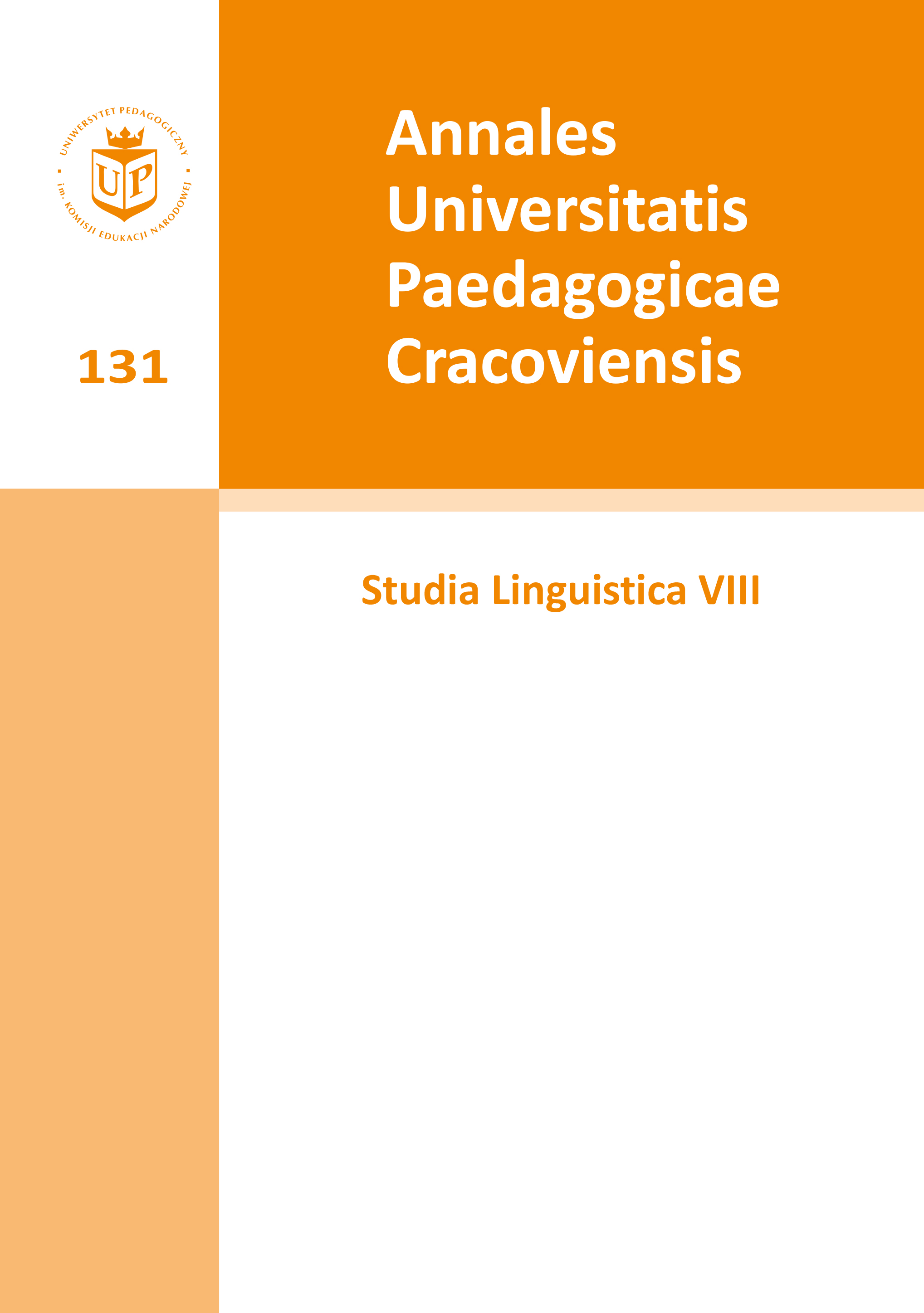Nazwy kar w Księgach gromadzkich wsi Kasina Wielka
Main Article Content
Abstract
The author discusses a few interesting names of punishments, such as plagi (plagues), chłosta (whipping), miotełki (whisks), praszczęta (running the gauntlet), postronek (cord), kłoda (log), kuna (marten), gąsior (pillory), biskup (the bishop), łańcuch (chain), kajdany (shackles), okowy (fetters), więzienie (prison), turma (dungeon), sadzek, excerpted from Księgi gromadzkie [Community Books] of Kasina Wielka. For each name, the author provides the context of its usage and specifies the meaning. She supports her deliberations on the data taken from historical dictionaries of the Polish language.
Downloads
Article Details
Author, submitting a text to the editorial board of the journal “Annales Universitatis Paedagogicae Cracoviensis. Studia Linguistica", certifies that the content of the article has not been published so far and that the work does not violate in any way the copyright or related rights of other person, as well as other rights of third parties, and that no one's rights to the work (or any part thereof) have been missed. After signing the contract, the property rights to the published materials are transferred to the Scientific Publisher of the University of the National Education Commission, Krakow.
“Annales Universitatis Paedagogicae Cracoviensis. Studia Linguistica” is an open access journal, and all its content is made available free of charge to users and institutions under the Creative Commons CC-BY-NC-ND 4.0 license (attribution, non-commercial use, no derivative works). Under this license, the authors agree that their work may be lawfully reused for any purpose, except for commercial purposes, without the prior consent of the author or publisher. Everyone can read, download, copy, print, distribute and process these works, provided that the author's marking and the original publication place are correct. Published texts may not be used to create derivative works (e.g. to translate and publish in another language without the consent of the publisher). This is in line with the BOAI (Budapest Open Access Initiative) definition. "Studia Linguistica" does not charge for submitting or processing articles.
References
Baranowski B., 1955, Sprawy obyczajowe w sądownictwie wiejskim w Polsce wieku XVII i XVIII, Łódź.
Google Scholar
Historia państwa i prawa Polski, t. 2: Od połowy XV wieku do roku 1795, 1966, red. Z. Kaczmarczyk, B. Leśnodorski, Warszawa.
Google Scholar
Horyń E., 2004, Nazwy kar w Księgach sądowych wiejskich klucza jazowskiego (1663–1808), „Annales Academiae Paedagogicae Cracoviensis”, t. 19, „Studia Linguistica”, t. II, red. L. Bednarczuk, E. Stachurski, T. Szymański, s. 91–103.
Google Scholar
Horyń E., 2011, Nazwy kar w XVIII-wiecznych tarnowskich księgach sądowych, [w:] Badania historycznojęzykowe. Stan, metodologia, perspektywy, red. B. Dunaj, M. Rak, Kraków, s.227-237.
Google Scholar
Kobylińska J., 2006, Księgi sądowe wiejskie – historia i wartość badawcza, [w:] Język w urzędach i w sądach, red. M.T. Lizisowa, Kraków, s. 125–136.
Google Scholar
Łyjak A., 1998, Dawne narzędzia kar i tortur. Słownik, Kraków.
Google Scholar
Rafacz J., 1932, Dawne polskie prawo karne. Część ogólna, Warszawa.
Google Scholar
Zajda A., 1990, Staropolska terminologia prawnicza (do 1500 r.), Kraków.
Google Scholar
Zajda A., 2001, Studia z historii słownictwa prawniczego i frazeologii, Kraków
Google Scholar
Zaleski J., 1998, Język Aleksandra Fredry, [w:] Polszczyzna południowo-wschodnia. Język Aleksandra Fredry i inne studia, Kraków, s. 15–71.
Google Scholar
